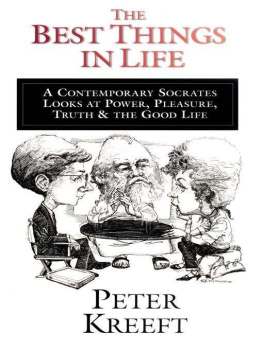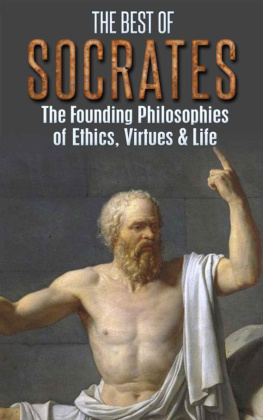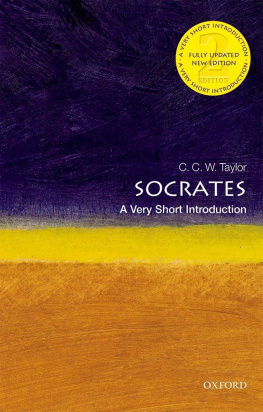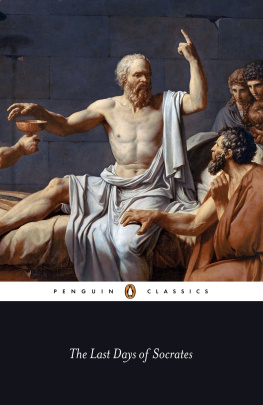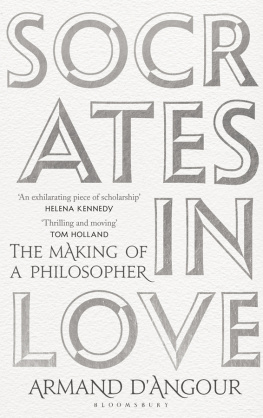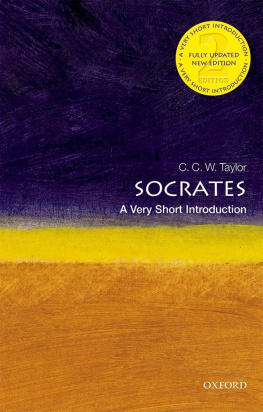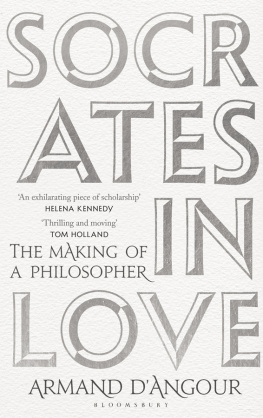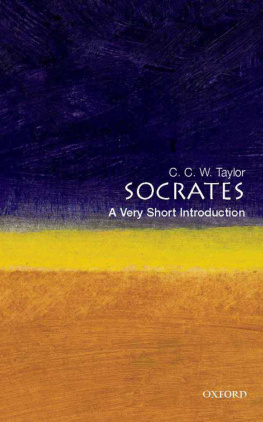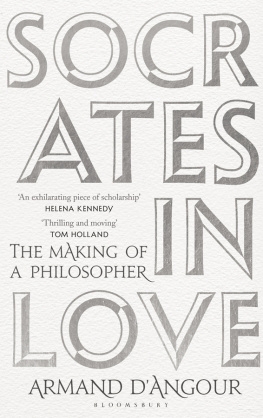A TRIANGLE SQUARE BOOK FOR YOUNG READERS
PUBLISHED BY SEVEN STORIES PRESS
Copyright 2022 by Devra Lehmann
All rights reserved.
No part of this book may be reproduced,
stored in a retrieval system, or transmitted in any
form or by any means, including mechanical, electronic,
photocopying, recording, or otherwise, without the
prior written permission of the publisher.
Maps on pages are based on Adobe Stock images.
Hackett Publishing Company takes no responsibility for the
modifications to the map on .
SEVEN STORIES PRESS
140 Watts Street
New York, NY 10013
www.sevenstories.com
Library of Congress Cataloging-in-Publication Data
NAMES: Lehmann, Devra, author.
TITLE: Socrates : a life worth living / Devra Lehmann.
DESCRIPTION: New York : Seven Stories Press, [2022].
Includes bibliographical references.
Audience: Grades: 10-12.
IDENTIFIERS: LCCN 2021061962
ISBN 9781644211366 (hardcover)
ISBN 9781644211373 (ebook).
SUBJECTS: LCSH: SocratesJuvenile literature.
PhilosophersGreeceBiographyJuvenile literature.
Philosophy, AncientJuvenile literature.
CLASSIFICATION: LCC B316 .L44 2022
DDC 183/.2dc23/eng/20220302.
LC record available at https://lccn.loc.gov/2021061962
Teachers may order free
examination copies of Seven Stories Press titles.
Visit https://www.sevenstories.com/pg/resources-academics
or email .
Book design by Stewart Cauley and Beth Kessler
Printed in the USA
9 8 7 6 5 4 3 2 1
In memory of my father,
Asher Sorrel Wolfe,
my own Socrates
this motionless forgetful where
turned at his glance to shining here;
that if (so timid air is firm)
under his eyes would stir and squirm
e. e. cummings
Attic Red-Figure Cup
Fragment, Greek,
ca. 470450 BCE.
Attributed to the
Akestorides Painter. J.
Paul Getty Museum.
Image courtesy of the
Gettys Open Content
Program.
Contents
MAPS
Mainland Greece and the Aegean with inset of Attica
The city of Athens
Highlights of the Agora toward the end of Socratess life
The Long Walls of Ancient Athens
Acknowledgments
I am grateful to the many socratic midwives to this book. First are my students, who have shown me again and again their passion for meaningful discussions about big ideasas well as their need for books to help them navigate our rich intellectual heritage. Next are the many people who have been my own guides. Tirosh Feldman kept me challenged and helped me identify what I was trying to say. Karen Klockner responded to my disastrous first drafts with her magnificent blend of compassion and honesty. Debra Nails graced me with her breathtaking erudition and exactitude, providing me with a wealth of source material, answering my endless questions, and setting me right where I went wrong. Geoff Bakewell, Mark Anderson, and Yona Gonopolsky contributed articles, advice, expertise, and encouragement, and Sylvie Dumont patiently explained the ins and outs of using images from the generous collection of the American School of Classical Studies at Athens.
Andy Ross, my agent, was energetic in finding my work a home at Seven Stories, where Dan Simon, Ruth Weiner, and Lauren Hooker greeted it warmly. Lauren is the superb reader that every writer wants in an editor. She asked just the right questions, ferreted out the inconsistencies, and polished out the roughness. Conor OBrien copyedited with an acuity that saved me from many an excess, ambiguity, and stupid mistake; Beth Kessler and Stewart Cauley gave the finished work a beautiful, bold design; and Tal Mancini proofread with patience and care.
Friends and family have contributed in more subtle but no less important ways. I treasure long walks and good talks over knitting and coffee with many wonderful companions. Your friendship has provided sustenance and sanity, especially as the certainties of youth have receded. Hindy, you have also contributed your photographic skills, and I thank you once again for your help. Danny, Roni, Ariella, Matanel, J.J., Naama, and Noam, you warm me with your love and keep me on my toes with the ping-pong of your discussions and the zaniness of your humor. Omer, Eyal, Nehara, and Aluma, I hope that you will always see the world through your bright, curious eyes. Maybe one day youll read Bubbys books. Mom, I hope that you enjoy this fruit of your many sacrifices, and Gil, thanks for your priceless attempts at rap and your pride in your little sister. Ron, it all begins and ends with you.
In e. e. cummingss beautiful words, my father, Asher Sorrel Wolfe, was a man who lived his soul. He died just as I began writing my first draft, and I felt his presence at every stage of the work. He is the person to whom I am most indebted for my love of reading, writing, and thinking, and I have dedicated this book to his memory.

Mainland Greece and the Aegean, with inset of Attica
Prologue
Even now, in his final hours in a grim prison cell, Socrates kept asking his questions. About fifteen men had occupied the room since the early morning, their dread steadily mounting as the sun made its course across the sky. But Socrates had engaged his visitors in such animated conversation, and his manner had been so probing, so lively, so full of good cheerin short, so much the way it always wasthat he had turned the day into a curious sort of celebration. His friends had almost forgotten where they were and what was about to occur.
For years these men had followed Socrates around Athens. He had drawn them into spirited discussions in the marketplace and craftsmens workshops, the athletic facilities and judicial precincts, the homes of wealthy men and the shady banks of a river. Most of these friends were locals, but others had come from far away to seek him out. And they were not the only ones who had flocked to his side. Socrates engaged trendsetters and intellectuals, aristocrats and slaves, shoemakers, neer-do-wells, artists, politicians, writers, and even occasionally a woman, unusual at a time when public life was almost exclusively male. These individuals had not come to him for answers, for he had surprisingly few of those to give. Instead, he offered questions and the opportunity to think. What is virtue? What is friendship? What is beauty?
All of that was coming to an end. The visitors had nurtured their hopes for several weeks, but the last rays of light were fading in the west, and now the outcome was inevitable. Socrates, their dear friend, was about to die. They could already hear the prison official making his way down the passage that ran between the rows of cells. The mans steps were slow and deliberate, but soon enough he appeared in the doorway, careful not to spill the liquid in the clay cup he was holding. The visitors closest to him instinctively drew away. The cup was small, but the poison it contained would kill even the strongest man within minutes. Only the prisoner, sitting on his bed, maintained his composure. Well, my good man, Socrates said, you are an expert in this; what must one do?


